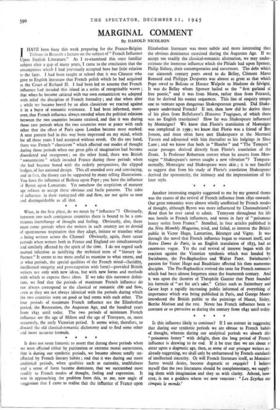* * * * Wnat, in the first place, do
we mean by " influence "? Obviously, between two such contiguous countries there is bound to be a con- tinuous interchange of thought and feeling. Obviously, also, there must come periods when the writers in each country are so devoid of spontaneous inspiration that they adapt, imitate or translate what as being written across the Channel Obviously, again, there occur periods when writers both in France and England are simultaneously and similarly affected by the spirit of the time. I do not regard such mutual infection as justifying the technical term of " literary in- fluence." It seems to me more useful to examine to what extent, and at what periods, the special qualities of the French mind—(lucidity, intellectual integrity and preoccupation with form)—provided British writers not only with new ideas, but with new forms and methods with which to express those ideas. If we take this narrower defini- tion, we find that the periods of maximum French influence do not always correspond to the classical or romantic ebb and flow, even as they are not always identical with the periods during which the two countries were on good or bad terms with each other. The four periods of maximum French influence are the Elizabethan period, the Restoration, the Augustan Age, and the hundred years from 1845 until today. The two periods of minimum French influence are the age of Milton and the age of Tennyson, or, more accurately, the early Victorian period. It seems wiser, therefore, to discard the old classical-romantic dichotomy and to find some other and more accurate formula.
* * * *






























 Previous page
Previous page